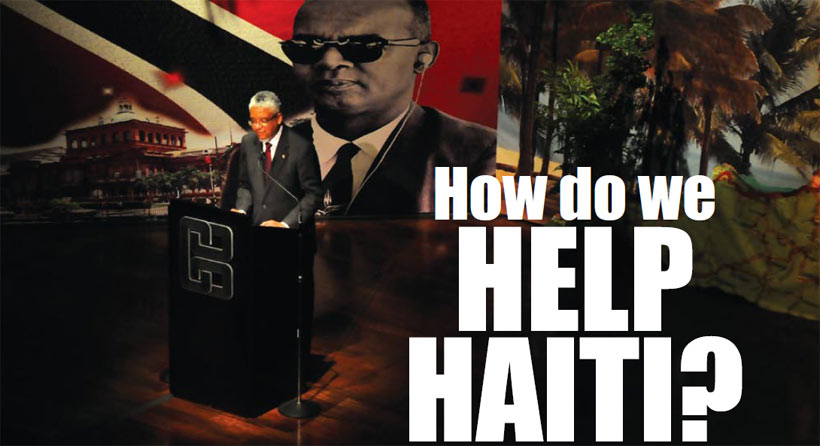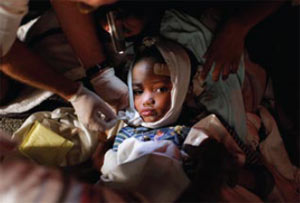|
August 2010

Issue Home >>
|

“I make a plea to our governments, private sector and civic leaders in the Caribbean to partner with us in helping to fund the housing and living requirements of these students. We need to raise at least US$1 million to house even the present students we shall admit.”
Vice Chancellor of The University of the West Indies, Professor E Nigel Harris, delivered the annual Eric Williams Memorial Lecture on July 9, 2010. The lecture, “Haiti and its many crises and its place in the Caribbean,” covered the historical journey of Haiti and looked at ways to help rebuild the country. This is an edited excerpt of his address.
As tragic as the Haitian earthquake has been, its occurrence has created an opportunity for Haiti, for the world, for the nations of CARICOM and countries in the Caribbean basin. CARICOM has an opportunity to play a special role in this global constellation, because it is we who first opened our arms to Haiti and it is with us that Haiti has so much in common. This is a moment of transformation and the leaders of Haiti and many members of the international community are talking, not about reconstructing what existed, but of a “Re-founding” of the country. This means fashioning a new country with stable democratic government, orderly systems of administration that can deliver services to all Haiti’s people with assistance from, but not dominated by NGOs; of government authority distributed across the country rather than concentrated in the capital; of a thriving, sustainable economy; reliable management of water and waste; of buildings erected to withstand the forces of nature in better planned communities; of an effective and accessible system of health care; of a well designed, high-standard education system from primary through secondary to tertiary education that provides the knowledge, skills and attributes to drive transformation and social and economic growth.
In the months since the earthquake, the leaders of Haiti in concert with the international community have finalised an Action Plan for National Recovery and Development and identified priority areas for action. With promised funding support from the international community, this plan is designed to provide sustainable social and economic development through reconstruction, investment, employment and income generation. The international community has pledged $5.3 billion over the next two years to transform Haiti into a modern state.
What role must CARICOM play? We cannot provide much in the way of funds, but our historic relationship to Haiti and our geographic proximity puts us in a significant position to provide technical and professional support. …
Assistance can be provided in areas of legislation, tax reform and establishment of a system that enables provision of land titles. CARICOM personnel from the public and private sectors can go to Haiti on secondment and Haitian personnel can come to our countries for training. These are steps that can be made by involvement of all countries and institutions of CARICOM, including academic institutions.
We need to forge a triangular relationship: funds and material support from the North, provision of technical and professional support from CARICOM nations and the implementation of the Recovery Plan guided by Haitian leadership. While the press and people remain sceptical about the progress being made by CARICOM towards a Caribbean Single Market and Economy, insufficient attention has been paid to good progress in terms of functional cooperation reflected in commonly shared institutions such as The University of the West Indies, the Caribbean Examinations Council (CXC), the Caribbean Association of Industry and Commerce (CAIC), the Caribbean Tourism Organisation (CTO), The Caribbean Disaster and Emergency Management Agency (CDEMA), and more. By linking with Haiti in areas of business, particularly in the fields of reconstruction, agriculture and light manufacturing–areas targeted to jump-start the Haitian economy–and by drawing Haiti into the CARICOM network of education, health, tourism, disaster risk reduction and environmental protection, all elements of functional cooperation, Haiti will benefit and it is likely CARICOM, if it positions itself correctly, can also benefit. Indeed, if we were to be truly ambitious, we can envision a functionally cooperative and an integrated economic community much larger than CARICOM and Haiti, to include the Dominican Republic, Cuba and Puerto Rico and other islands in the Caribbean basin.
The University of the West Indies too sees the earthquake in Haiti as a moment of opportunity. Within a week of the tragedy, our leaders met and began constructing short and long term plans. In the short term, staff and students engaged in collection drives of food, clothing, personal hygiene products and other such items. Bank accounts were opened on all Campuses and funds deposited will be used towards assisting students in need.
Our academic community on all campuses, including the Open Campus, held symposia, talks and wrote articles in the media aimed at sensitising and educating the general public and our internal community. This was meant to inform people about the current situation in Haiti and to tell the story of its vibrant history and culture.
Drawing on a database of expertise that our University has constructed to identify academic and non-academic staff who can respond to disasters, two civil engineers from the Faculty of Engineering in Trinidad, Dr. Derek Gay and Dr. Richard Clarke, went to Haiti as members of the CDEMA Team. Some medical personnel were also deployed to Haiti. Prior to the earthquake, Dr. Assad Mohammed had been working on urban planning projects in Haiti and Professor John Agard on a reforestation project.
 In truth, we see ourselves as playing a more sustained role in the Haiti re-founding effort. In March 2010, we seized the moment to convene a meeting of UNICA, the Association of Caribbean Universities and Research Institutes, encompassing universities from the Spanish, French and Dutch-speaking Caribbean. Rectors of four of the universities in Haiti were invited to report on the effects of the devastating earthquake on their institutions, which wiped out 90% of the university infrastructure, killed about 40 academics and over 200 students, some of whom were buried in the buildings in which classes were being held. The UNICA meeting was asked to begin discussions on how Caribbean universities might help in the re-founding of the Haitian tertiary education sector. We hope we can rally Caribbean universities to provide advocacy with their Governments for sustained help for Haiti and that these universities, some bigger and better endowed than we are, can provide, places for students both undergraduate and graduate, provision of academics and provision of expertise in the broader recovery effort. In truth, we see ourselves as playing a more sustained role in the Haiti re-founding effort. In March 2010, we seized the moment to convene a meeting of UNICA, the Association of Caribbean Universities and Research Institutes, encompassing universities from the Spanish, French and Dutch-speaking Caribbean. Rectors of four of the universities in Haiti were invited to report on the effects of the devastating earthquake on their institutions, which wiped out 90% of the university infrastructure, killed about 40 academics and over 200 students, some of whom were buried in the buildings in which classes were being held. The UNICA meeting was asked to begin discussions on how Caribbean universities might help in the re-founding of the Haitian tertiary education sector. We hope we can rally Caribbean universities to provide advocacy with their Governments for sustained help for Haiti and that these universities, some bigger and better endowed than we are, can provide, places for students both undergraduate and graduate, provision of academics and provision of expertise in the broader recovery effort.
To lead the way, UWI stepped up to the plate. The Mona Campus offered 100 places, Cave Hill 25 and St. Augustine 75, and based on the wishes of our Haitian counterparts, places were offered to final-year students. For a number of reasons, including insufficient fluency in English, an unwillingness of some students to leave their families at this time and logistics, we shall fall short of the 200 for which we were aiming, but we have started something that can continue in the future, since we can assist too in graduate education and collaborative research which is not evident in Haiti at this time. I make a plea to our governments, private sector and civic leaders in the Caribbean to partner with us in helping to fund the housing and living requirements of these students. We need to raise at least US$1 million to house even the present students we shall admit. Some countries of the Caribbean have visited enormous cuts in funding on UWI. Despite this, we believe it is our fraternal duty as a Caribbean institution to assist in whatever practical ways we can in the re-founding of Haiti. However, we cannot do it all and it is for this reason we issue a public appeal to institutions and persons willing to assist in helping to fund living expenses, books and travel for these young people from Haiti.
In addition to admitting students to our Campuses, we are also working on a project that will provide courses by distance to Haitians through the Open Campus. These programmes are expected to utilize both Haitian and UWI academics to construct appropriate and culturally specific programmes in areas such as teacher education, justice and security. In the area of teacher education, the project will adopt a two-tiered approach. Initially, it will focus on teachers whose training was interrupted by the earthquake, and then attention will be paid to training primary and secondary untrained teachers, teacher trainers and university faculty. I thank Dr Glenford Howe of the Open Campus for preparing this proposal, which we have submitted to one multilateral agency so far. There is also a proposal that has received some initial funding to revive a training programme in Urban and Settlements Planning in Haiti. Dr Assad Mohammed of St. Augustine is leading this effort. As you can imagine, in reconstructing Port-au-Prince and other damaged areas, urban and settlement planning is a vital requirement.
Recognising that language is one of the most important barriers between Haiti and the Anglophone Caribbean, The UWI, the State University of Haiti, the University of Quisqueya and the University of Havana in Cuba have recently proposed the creation of an Institute of Languages and Translation for teaching of English, French, Spanish and Creole. This initiative will be expected to link with our Institute of Language Studies at St. Augustine and other similar units at Mona and Cave Hill. If this tragedy does nothing else for us in the Anglophone Caribbean, let it make us become resolute in our insistence that every school child at the primary level and by the secondary level should become fluent in at least one other language–Spanish or French–but preferably both. This may well be an opportunity for exchange between Spanish, French, Dutch and the Anglophone Caribbean of young people who can teach their language to countries speaking other languages. …
In relation to the activities of The University of the West Indies, let me state what so many of our people do not seem to see about The UWI. We are not only an institution that grants undergraduate degrees, we are a full-service entity able to impart knowledge and skills not only at the undergraduate level but also at the graduate and post-doctoral levels in broad areas relevant to Caribbean self-knowledge, growth and development. We are also committed and able to create new knowledge that can drive national and regional development, and through outreach, we can assist in providing the sort of broad-based, meaningful and sustained support for policy making and planning of our public and private sectors, and we can respond in varying ways to a situation such as that of Haiti.
I believe that no other institution in the Anglophone Caribbean has the capacity to contribute in such broad ways.
Credit:
Photo: Studio Works
|





